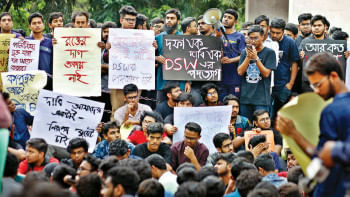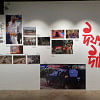July Revolution and Gen-Z’s march to mass political awareness

Gen-z don't read political histories, they can't remember our national heroes' names properly, and they even mix up between National Independence Day and Victory Day; how on earth can they gain critical analytical power to understand the hodgepodge situation of a repressive state ruled by autocracy in a dire regime of fascism?
This was a concern of many millennials, especially academics, who thought this generation would not achieve much. They don't raise their voice; they lack attention to crucial matters, and they are always busy playing video games and stuck in daydreams. But the July revolution has shown us what Gen-z are made of! Who knew the video game-playing indulgent generation would stand up against autocracy and fight for democracy, leaving their virtual field of battle?
One of my students, Shykh Aashabul Yamin, was also martyred in the deadly crackdown on July 18. Who knew the ever-revolting student of mine who would interrupt me in between my lectures with his sudden flow of questions on social issues would also jump courageously on RAB's armoured vehicle to prevent them from firing on unarmed students who were protesting?
Well, we millennials don't dare to lay our chest open in front of guns and goons in daylight and declare war on an autocratic government ruling this country for over a decade to reform the system. The reformation was necessary for the quota system and the legislative, administrative, and socio-political structures. These students and protesters have put a torch on the loopholes of the corrupted, invalid system where the entire state was failing as a legitimate democratic apparatus.
Eminent sociologist Althusser schemed how the state can entrap its citizens into the chains of fascism by repressing its demands and distracting its people by infiltrating different ideologies primarily through dominant hegemonic ones, as Marx had termed it as the superstructure controlling all other bases of society. Marcuse would chant it by naming all of "One-Dimensional Humankind" who will engulf themselves in entertainment and conspicuous consumerism, forgetting about their socio-political rights.
Let's not forget Gramsci's response to the functioning of the oppressive autocratic state that would legitimise itself by building "personal cults and beliefs," the dominant hegemonic ideas of the ruling political parties. Foucault's theory of power demonstrates the exact scenario of Bangladesh, where the capture of fascist power was regularised and mediated by making use of the personal tragedies of the former Prime Minister Shiekh Hasina, leading to the doctrine being symbolised all over the country through morals, sculptures, and visualisations of distorted histories in textbooks and other forms of discourses.
Just like many other fascist regimes, the former prime minister had abused her authoritarian power by applying both disciplinary and biopower, controlling people's emotive behaviour through digital sanctions and laws, and other forms of surveillance measures such as tapping phone calls, forced disappearances, and detention into "Aynaghor," a hidden dungeon of terror awaiting anyone who dared to show the slightest resistance to her autocratic governance. Disciplinary motives include preventing fair appointment in government jobs and favouring the goons of the government.
"The Rakkhi Bahini," or the student wing of the former ruling party, was just another form of discriminating disciplinary power practice exercised by her cabinet. Another instance of using sovereign power to kill anyone against her rule or challenge her autocratic stands was the "shoot on sight" order imposed against the protesting students that led to a bloodbath—killing hundreds of innocent people.
The excessive use of police forces in kidnapping, detaining people with opposing views, silent killing, leaving no traces behind, alleged killing of military officers in the Pilkhana carnage, etc., shows the exercise of the supreme power of Shiekh Hasina that seemingly detained the mass people of Bangladesh in a large prison cell. Foucault has beautifully termed it as a "Panopticon," where everyone is detained and under control. No power nor any state apparatus can stay still after such a horrifying experience of bloodshed, as was the consequence of the oppressive regime of Shiekh Hasina that led to her downfall and escape from the country. What a transformation of unity.
The courage and charisma of Gen-Z have been hailed, for they have finally become mass aware of their socio-political rights and started to ask for accountability, transparency, and honour. It is an evolution of this generation from being apolitical influencer kids rising to become the future leaders of our newly formed Bangladesh, which is still under construction and reformation, that needs to rise from ashes to pinnacles by removing all kinds of anarchy.
Farheen Akter Bhuian is a lecturer of Sociology at Military Institute of Science & Technology (MIST).
Views expressed in this article are the author's own.
Follow The Daily Star Opinion on Facebook for the latest opinions, commentaries and analyses by experts and professionals. To contribute your article or letter to The Daily Star Opinion, see our guidelines for submission.

 For all latest news, follow The Daily Star's Google News channel.
For all latest news, follow The Daily Star's Google News channel. 









Comments